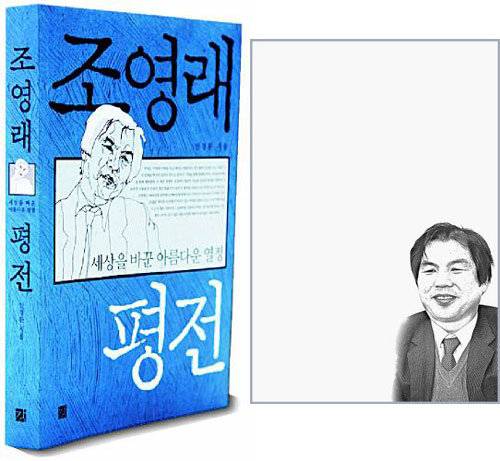Author Records Justice in a Gloomy Era
Author Records Justice in a Gloomy Era
Posted January. 14, 2006 03:00,

Laborer Jeon Tae-il was 22 when he set himself on fire at Pyeonghwa Market, Cheonggyecheon, Seoul. Cho Yeong-rae, wanted by police for his involvement in the Democratic Youth Students Union (DYSU) case, wrote down every detail of the young workers life. His writings, written in a notebook with letters the size of sesame seeds, was read by only by a few people in those dark times, and finally published in June 1983 by the Jeon Tae-il Memorial Hall Construction Committee. The book, titled, The Biography of Jeon Tae-il, had the name of the real author, lawyer Cho Yeong-rae, printed in the cover three days after the lawyers death.
The book is considered a report on the human conditions of Pyeonghwa Market workers in the 1960s, as well as a documentary recording the enlightenment and actions carried out in the course of the life of a worker.
The author of The Biography of Jeon Tae-il has now become the protagonist of The Biography of Cho Yeong-rae. Lawyer Cho was a man that lived a short, yet significant and fierce life. After waging an opposition movement against former President Parks attempt to revise the constitution to run for a third term while he was at Seoul National University Law School, he started his long journey for democracy. While studying at the Judicial Research and Training Institute (JRTI) he was put in jail for 1.5 years for allegedly being involved in a Seoul National University student conspiracy to cause civil war, and evaded authorities for six years for the DYSU case. After being pardoned in 1980, he returned to JRTI and earned a license to practice law. Before passing away, he left significant footprints as a human rights lawyer by taking cases like the Bucheon Police Station sexual torture case, and class action by Mangwon-dong flood victims.
Every December 12, the anniversary of Chos death, fellow human rights lawyer Hong Sung-woo, who advocated for human rights in the dark dictatorship era, holds a gathering in his memory. The Biography of Cho Yeong-rae was written by SNU Law Professor Ahn Kyung-hwan, a one-year university junior classmate of Cho over five years. He wrote it after being asked to write a biography by those attending the memorial gathering.
In June 1986, an unprecedented case occurred when a police officer named Moon Gwi-dong, working at Bucheon Police Station sexually tortured SNU Clothing Textile Department senior Kwon In-sook while investigating her under charges of being employed with a fake ID card. The crime took place in police stations interrogation room in the middle of the night. Cho spent the whole night writing his defense for Kwon. He was a slow writer who could write one sentence at a time.
He writes a paragraph, mumbles it, and then reads it out loud. Then he picks up his pen again. Until he heard the rooster crying at dawn on the trial day, Yeong-rae put his full mind and heart into editing and rewriting.
The defenses opening speech written by Cho and read by Hong Sung-woo, Hwang In-chul and Cho, starts with a question:
Who is this maiden, who every Korean not knowing her name only know her by last name, a celebrity without a name, an idol without a face?
This defense statement is praised as being the best work left behind by Cho, alongside The Biography of Jeon Tae-il.
A heavy smoker, Cho died on December 12, 1990 due to lung cancer. The disease that knocked him down was also Epochal Cancer.
The author tells us that Cho focused his biography mainly on young readers who did not experience the turbulent era that Cho lived in.
The life of a beautiful man who lived a fierce life is meticulously reproduced in a period recreated by the pen of a law professor with charming writing skills. Chos integral intelligence embodied the conscience of his era, but he did not fall victim to the trap of prejudiced ideology. The last letter that Cho left his wife ends like this: In a moment that affectionate longings wash sorrowfully like evening tides, I certainly feel that more than ever you and I are melting into one.
Fifteen years have passed since Cho passed away at the age of 43, but because the books subtitle is, A Beautiful Passion That Changed the World, there still exists the collective memory of those alive.
Ho-Taeck Hwang hthwang@donga.com







